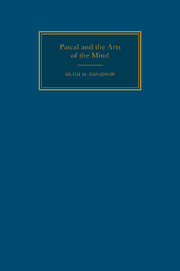1 - Nature and the world
Published online by Cambridge University Press: 26 January 2010
Summary
As an introduction to the questions of how and in what specific ways Pascal goes about solving his problems, let us in a rapid survey try to gain a sense of certain distinctions and choices regarding what he wishes to consider and investigate. I take it as a valid assumption that he, like the rest of us, has more things to think about than he has ways of thinking about them. It seems worthwhile, therefore, to recall in a preliminary fashion the range of his curiosity and the scope of his inquiries. I realize that, although what he thought about and how he thought about it may be distinguished, the two cannot be finally separated. Nevertheless, in this introductory chapter, I should like, first, to attempt a survey of the former and then, against that background, to propose concerning the latter a group of intellectual arts that Pascal used in defining and exploring the subject matters of interest to him. The topics set by those arts will be given detailed developments in the remaining chapters of this book.
Pascal is basically a realist; he constantly stresses being and things; he may refer at significant points to what he calls le néant, nothingness, but he poses against that everything else to which he intends to give sustained attention. Because of his gift and appreciation for mathematical thinking he does not escape completely the appeal of idealism, of clear and distinct ideas that tend to replace reality. However, he does not start from thought – as did Descartes, who got to things indirectly, by a complicated line of reasoning that took off from self-awareness and the contents of consciousness.
- Type
- Chapter
- Information
- Pascal and the Arts of the Mind , pp. 1 - 23Publisher: Cambridge University PressPrint publication year: 1993



